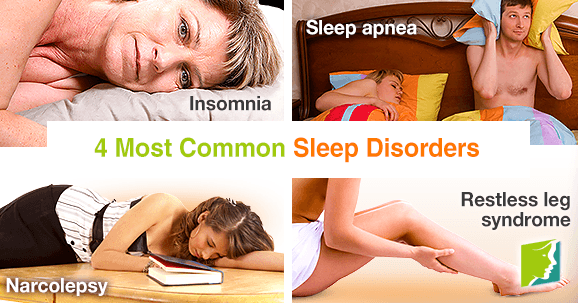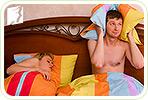At some point in your life, you have probably experienced the demoralizing side effects of a night that went a little too late or been the victim of a restless sleep. Sleep is an imperative part of survival, on par with food and water. In fact, lack of sleep has been shown to increase the risk of depression, loss of concentration, and a weakened immune system.
Trouble sleeping tends to increase with age - bad news for women going through the phases of menopause. This in turn, exacerbates an inability to sleep, creating a vicious cycle. To arm yourself with knowledge, read about the most common sleep disorders.
4 Most Common Sleep Disorders
Of the more than 70 that exist among 65 million sufferers, here are the top four menopausal sleep disorders that women complain the most.
Insomnia
Insomnia is when a person has difficulty falling asleep or staying asleep. It can also manifest itself in the early hours of the morning, making it impossible to go back to sleep upon waking at an unreasonable time. This frequently means that insomniacs feel excessively tired during the day, but still find they must count sheep in their beds later.
Sleep apnea
Sufferers of sleep apnea may not necessarily wake up during the night, but their sleep is nevertheless interrupted by irregular breathing. Common traits of sleep apnea include intermittent bouts of gasping or snorting, which results in sleep that is anything but restorative.
Narcolepsy
Episodes of narcolepsy are described as “sleep attacks,” and are characterized by excessive daytime fatigue, irresistible sleepiness, and muscle weakness. Because these attacks come on suddenly, even during physical activity, they can be highly disruptive to daily life and even dangerous.
Restless leg syndrome (RLS)
This disorder commonly involves feelings of creeping, pulling, tingling, or achy sensations in the legs, which are then relieved by moving or rubbing them. Sometimes the urge to move the legs becomes overpowering, and even sitting for short periods of time becomes uncomfortable.
Solutions for Sleep Disorders
In menopausal women, the culprit behind sleep disorders is the natural waning of hormones. Estrogen and progesterone play important roles in the body's many functions, and their decline produces sleep disorders. Melatonin is a hormone that helps regulate the sleep cycle, an internal pacemaker that controls the timing and our drive for sleep.
The best thing to do is get your body back into balance, achieved most readily by a healthy diet and regular exercise, but avoid sugar and dairy products and exercise to close to bedtime. Natural remedies, such as herbal supplements, have also shown great success in women. For resting easy, both mentally and physically, learn more about the best way to treat sleep disorders.
Sources
- National Institutes of Health. (n.d.) Information about Sleep. Retrieved January 22, 2015, from https://science.education.nih.gov/supplements/nih3/sleep/guide/info-sleep.htm.
- Office on Women's Health. (2012). Insomnia fact sheet. Retrieved January 22, 2015, from http://womenshealth.gov/publications/our-publications/fact-sheet/insomnia.html




